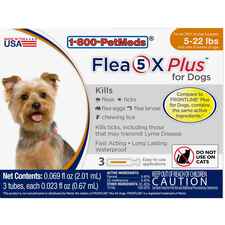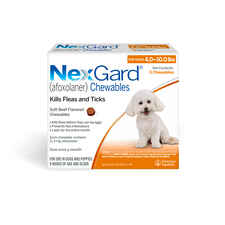Over-the-Counter vs. Rx Flea & Tick Meds: 3 Reasons Your Pet’s Flea & Tick Prevention May Require A Prescription
Doctor of Veterinary Medicine

While efforts are made to answer all questions as quickly as possible, if an immediate answer is required or if your pet is in need of urgent or emergency care, contact your pet's veterinarian immediately.
Doctor of Veterinary Medicine

You will receive an answer from Dr. Lindsay and our vet/tech team as soon as possible, usually the same day.
All answers are provided for informational or educational purposes only, and are intended to be a supplement to, and not a substitute for, the expertise and professional judgment of your pet's veterinarian.
It may be necessary to consult your pet's veterinarian regarding the applicability of any opinions or recommendations with respect to your pet's symptoms or medical condition.
CloseDoctor of Veterinary Medicine

An error has occurred, please reload the page and try again.
CloseWhile efforts are made to answer all questions as quickly as possible, if an immediate answer is required or if your pet is in need of urgent or emergency care, contact your pet's veterinarian immediately.
There is no answer related to your question

When it comes to fleas and ticks, preventatives are your pet’s first line of defense. For some, over-the-counter flea and tick products are enough to keep pests at bay. But if you’re looking for a solution that’s more convenient, more potent, or offers broader protection, your veterinarian can prescribe a prescription flea and tick preventative that’s right for your pet.
Why Some Flea and Tick Medications Are Sold Over-The-Counter
Some of the most popular flea and tick products sold by PetMeds.com do not require a prescription. You can simply add OTC flea and tick preventative to your cart or start an AutoShip subscription, check out, and have your pet’s preventions delivered to your door.
Over-the-counter flea and tick preventatives are regulated by the Environmental Protection Agency (EPA), while prescription preventatives are regulated by the Federal Drug Agency (FDA). Just like prescription products, OTC preventatives are evaluated to be safe and effective.
Why Your Pet’s Flea and Tick Prevention May Require A Prescription
Certain flea and tick preventatives can only be sold with a prescription. The script must be renewed every 12 months. Most pet parents simply have their veterinarian renew it each year when their pet has their annual wellness check-up.
Prescription options require authorization from your vet for three reasons:
1. Prescription flea and tick prevention can be all-in-one.
Cats and dogs need both flea and tick preventatives and a heartworm preventative. Heartworm preventatives work by killing any heartworm larvae that may be in your pet’s bloodstream. All heartworm prevention requires a prescription because your pet must test negative for heartworm before they can use it. Preventatives can be dangerous to pets that have a full-blown infection. Combo flea and tick prevention that also kills heartworm, roundworm, and other internal parasites are convenient and can help you save money, but you’ll need a prescription from your veterinarian.
2. Over-the-counter flea and tick medications are usually topical.
The majority of prescription flea and tick preventatives are given orally, usually as a tasty, chewable tablet. Over-the-counter flea and tick medications are used topically, in the form of spot-on drops that you apply to your pet’s skin or as a collar that slowly releases the preventative. You do not need a prescription for most topical flea and tick medications, including spot-on treatments, a Seresto collar, or flea and tick shampoo.
3. Prescription flea and tick medications may use more potent ingredients.
In some regions, veterinarians are seeing an uptick in cases where fleas and ticks are becoming resistant to ingredients in over-the-counter preventatives. If your preventative isn’t working, your veterinarian may recommend something stronger. Prescription flea and tick medications use different ingredients that can be more effective. However, they can have a smaller margin of error when it comes to safe, effective use, so you can only buy them with your veterinarian’s guidance.
 Swipe
Swipe


























